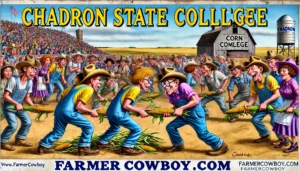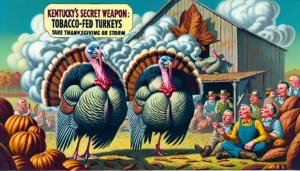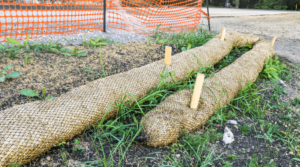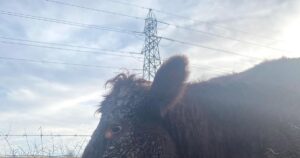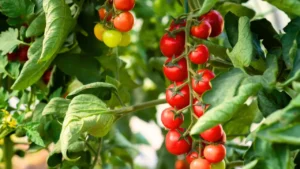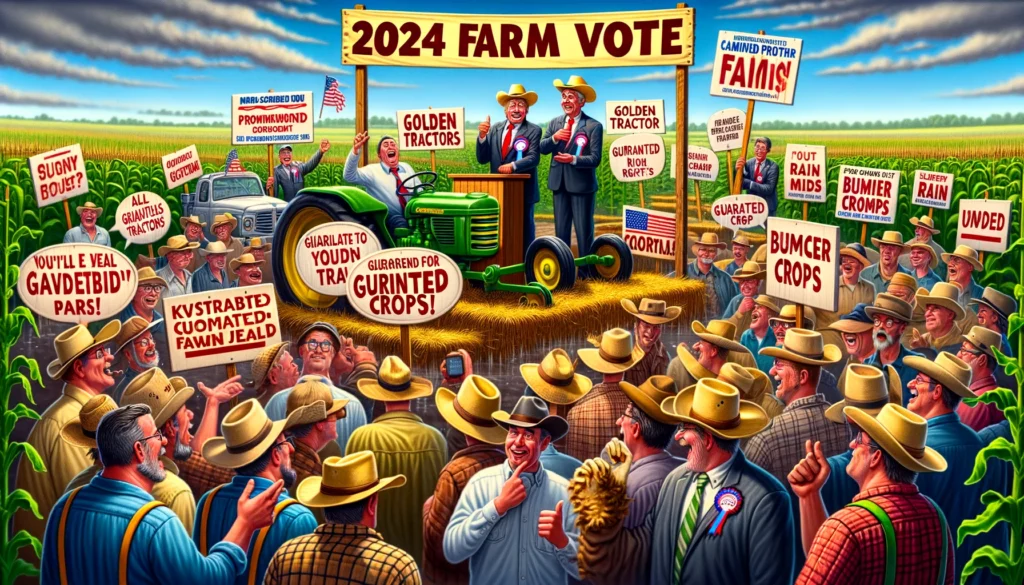
Farm Vote 2024 A satirical and humorous image depicting the 2024 FARM Vote with political candidates vying for the farmers support. The scene shows candidates in a.webp.webp
But as Trump and Kamala crisscross the Midwest, their promises are starting to sound more like fairy tales than feasible policy. From Trump’s grand vision of gold-plated tractors to Kamala’s guarantee of rain on righteous row crops, it’s clear that both candidates are planting seeds of skepticism along with their campaign slogans.
The Golden Tractor Fantasy
At a recent rally in Sioux City, Donald Trump took the stage with his usual flair, promising to “Make Farming Great Again” with golden tractors for every farmer. “These aren’t just any tractors,” Trump boasted, “they’re the best tractors. Nobody knows tractors better than me. And believe me, when you’re driving a golden tractor, you’re going to feel like a king.”
The crowd cheered, though some farmers exchanged puzzled glances. A golden tractor? Really? As one attendee, Tom Jenkins, a corn farmer from Nebraska, put it, “I don’t need a gold tractor. I need one that works and doesn’t break down every other week. But hey, if he’s giving them out, I’ll take one.”
Dr. Linda Fields, an agricultural economist at the University of Nebraska, weighed in on the promise. “Golden tractors are symbolic of Trump’s tendency to go big or go home,” she said. “It’s not about practicality; it’s about making a statement. But in the world of farming, where margins are tight, farmers are more interested in efficiency than extravagance.”

Kamala’s Righteous Rainfall
Not to be outdone, Kamala Harris rolled into town the following week, offering her own brand of agricultural miracles. “Farmers are the heart and soul of this nation,” she declared. “And under my administration, I promise that rain will always fall on the righteous row crops. No more droughts, no more floods—just the perfect amount of rain for every field.”
The crowd applauded, though there were a few chuckles. Mary Thompson, a soybean farmer from Iowa, said, “If Kamala can control the weather, then I’ll vote for her twice. But until then, I’ll keep praying to the actual rain gods.”
Meteorologist Dave Johnson was less enthusiastic about Kamala’s weather promises. “Weather is unpredictable by nature, and no politician can change that,” he said. “While it’s a nice sentiment, farmers know better than to rely on politicians for something as fickle as rain.”

Planting the Seeds of Success (And Fertilizing Them with Taxpayer Dollars)
Kamala’s promises didn’t stop with rain. She vowed to “plant the seeds of success” in rural America, fertilizing them with government support. “We’re going to make sure that every farmer has the resources they need to thrive,” she said. “And yes, that includes financial support from the federal government.”
Earl Jenkins, a soybean farmer who’s seen his fair share of political promises, wasn’t convinced. “Government support sounds great on paper, but I’ve been farming long enough to know that the checks don’t always arrive on time, and when they do, they’re never as big as you’d hoped.”
Dr. Fields agreed, noting that while subsidies and financial support are important, they’re not a cure-all. “Farmers need more than just handouts,” she said. “They need stable markets, fair trade deals, and access to modern technology. Simply throwing money at the problem isn’t going to fix it.”
Trump’s New Slogan: “Make Farming Great Again—With Even Bigger Subsidies!”
Not one to be outdone in the subsidy department, Trump fired back with a new campaign slogan: “Make Farming Great Again—With Even Bigger Subsidies!” He promised to double, maybe even triple, the amount of financial support given to farmers. “Under my administration, farmers won’t just survive—they’ll thrive!” he declared.
The crowd roared its approval, but some farmers remained skeptical. “Subsidies are great, but they’re not a long-term solution,” said Bill Anderson, a wheat farmer from South Dakota. “What we need is a sustainable plan, not just a band-aid.”
Agricultural policy analyst Susan Clark echoed this sentiment. “Subsidies can provide short-term relief, but they don’t address the underlying issues facing the agricultural industry,” she said. “Farmers need comprehensive policies that support innovation, sustainability, and market access.”

Guaranteed Bumper Crops: Who Needs Weather Patterns?
Kamala Harris didn’t stop at rain guarantees. She promised farmers that under her administration, they would enjoy bumper crops every year, regardless of weather patterns. “We’re going to make sure that every farmer’s hard work pays off,” she said. “No more worrying about droughts or floods—just bountiful harvests year after year.”
The farmers in the audience exchanged amused glances. “If she can make that happen, she deserves a Nobel Prize,” joked Sam Miller, a corn farmer from Iowa. “But until then, I’ll keep my fingers crossed and hope for the best.”
Climate scientist Dr. Karen White wasn’t convinced. “Weather patterns are complex and unpredictable,” she said. “No politician can promise perfect conditions for farming. What farmers need are tools and strategies to adapt to changing conditions, not empty guarantees.”

Trump’s Negotiations with Mother Nature
Not to be outdone, Trump promised to bring back American wheat by negotiating directly with Mother Nature. “I’ve made deals with some tough negotiators in my time,” he said. “But let me tell you, no one negotiates like Mother Nature. And when I’m done, we’re going to have the best wheat crops this country has ever seen.”
The crowd laughed, but some farmers wondered if Trump was serious. “Negotiating with Mother Nature?” asked John Peterson, a wheat farmer from Kansas. “I’d love to see that. Maybe he can convince her to give us a little more rain next year.”
Meteorologist Dave Johnson was equally skeptical. “Nature doesn’t negotiate,” he said. “Farmers know that better than anyone. They’ve learned to work with the land, not against it. Promising to change weather patterns is like promising to change the tides—it’s just not going to happen.”
The Double-Milk Cow Promise
Kamala Harris, determined to out-promise her rival, guaranteed that under her administration, every cow would produce double the milk. “We’re going to make sure that our dairy farmers get the support they need,” she said. “And that includes more productive cows.”
Dairy farmer Sarah Jenkins was amused but doubtful. “If she can make my cows produce double the milk, I’ll vote for her every time,” she said with a laugh. “But until then, I’ll stick with my regular old cows.”
Agricultural scientist Dr. Robert Green weighed in on the feasibility of Kamala’s promise. “There are limits to how much milk a cow can produce,” he said. “While improvements in breeding and nutrition can increase productivity, there’s no magic solution that will double output overnight.”
The Wall Around Farms: Protecting Crops from Bad Weather
Trump upped the ante by promising to build a wall—not just around the country, but around every farm, to protect crops from bad weather and bad policies. “We’re going to build the best walls,” he said. “These walls will keep out the wind, the rain, and any bad policies that try to come your way.”
The crowd cheered, though some farmers looked skeptical. “A wall around my farm?” asked Jake Thompson, a corn farmer from Nebraska. “I’m not sure that’s going to help much when the wind blows.”
Dr. White, the climate scientist, was quick to point out the flaws in Trump’s plan. “Walls won’t stop weather patterns,” she said. “What farmers need are strategies to adapt to changing conditions, not physical barriers that won’t solve the problem.”
Kamala’s LinkedIn for Farmers
Kamala Harris promised to ensure that every farmer’s LinkedIn profile is as fruitful as their fields. “In today’s world, networking is just as important as plowing,” she said. “We’re going to make sure that every farmer has the tools they need to succeed—not just in the fields, but in the business world as well.”
The farmers in the audience exchanged amused glances. “I’m not sure how a LinkedIn profile is going to help me sell more corn,” said Tom Jenkins, the corn farmer from Nebraska. “But if it helps me find better prices, I’m all for it.”
Marketing expert Linda Green explained the logic behind Kamala’s promise. “In today’s digital age, having a strong online presence can help farmers connect with buyers and suppliers,” she said. “But it’s important to remember that online networking is just one piece of the puzzle. Farmers need real-world connections and market access as well.”
Trump’s Rain-Making Trade Deal
Trump promised to end droughts by making it rain with his latest trade deal. “We’re going to make the best deals,” he said. “And when I’m done, it’s going to rain like you’ve never seen before. The crops are going to grow, and the farmers are going to be happy.”
The crowd laughed, but some farmers were skeptical. “If he can make it rain, he deserves a medal,” said Sam Miller, the corn farmer from Iowa. “But until then, I’ll keep praying to the actual rain gods.”
Meteorologist Dave Johnson was quick to debunk Trump’s promise. “Trade deals don’t change weather patterns,” he said. “What farmers need are strategies to adapt to changing conditions, not empty promises of rain.”
Clean Energy Farming: Kamala’s Solar-Powered Tractor
Kamala Harris promised to revolutionize farming with clean energy, including solar-powered tractors. “We’re going to make sure that our farmers have the tools they need to succeed in a clean energy future,” she said. “And that includes solar-powered tractors.”
The farmers in the audience looked intrigued but skeptical. “A solar-powered tractor sounds great in theory,” said Jake Thompson, the corn farmer from Nebraska. “But I’m not sure how well it’s going to work on a cloudy day.”
Clean energy expert Dr. Susan Clark weighed in on the feasibility of Kamala’s promise. “Solar-powered tractors are a promising technology, but they’re still in the early stages of development,” she said. “Farmers need reliable equipment that can perform in all conditions, not just when the sun is shining.”
The Direct Line to the White House
Trump promised to give every farm a direct line to the White House. “When I’m president, you’ll be able to call me anytime,” he said. “We’re going to make sure that your voice is heard—loud and clear.”
The farmers in the audience looked amused. “I’m not sure what I’d say if I had a direct line to the White House,” said Bill Anderson, the wheat farmer from South Dakota. “But I guess it’s nice to know I could call if I needed to.”
Political analyst Dr. Linda Fields was skeptical of Trump’s promise. “Direct access to the White House sounds nice in theory,” she said. “But in reality, farmers need representatives who can advocate for their interests at all levels of government, not just a hotline to the president.”
Kamala’s Magical Market Stabilization Plan
Kamala Harris promised that farmers would never have to worry about crop prices again, thanks to her magical market stabilization plan. “We’re going to make sure that farmers get a fair price for their crops,” she said. “No more price fluctuations, no more uncertainty—just stable, predictable markets.”
The farmers in the audience looked intrigued but skeptical. “If she can make that happen, she deserves a Nobel Prize,” joked Sam Miller, the corn farmer from Iowa. “But until then, I’ll keep my fingers crossed and hope for the best.”
Agricultural economist Dr. Susan Clark was quick to point out the flaws in Kamala’s plan. “Market fluctuations are a natural part of the agricultural industry,” she said. “While efforts to stabilize prices are important, it’s unrealistic to promise complete market stability.”
Trump’s “Yuge” Harvest Promise
Trump assured every farmer that their harvest would be “yuge” as long as they voted for him. “We’re going to have the best harvests, folks,” he said. “It’s going to be yuge—just like everything else I do.”
The crowd laughed, but some farmers were skeptical. “If he can make my harvest bigger, I’ll vote for him every time,” said Jake Thompson, the corn farmer from Nebraska. “But until then, I’ll stick with my regular old crops.”
Agricultural scientist Dr. Robert Green weighed in on the feasibility of Trump’s promise. “There are limits to how much a crop can yield,” he said. “While improvements in technology and farming practices can increase productivity, there’s no magic solution that will double output overnight.”
Kamala’s Seeds of Equality
Kamala Harris promised to plant seeds of equality, one soybean at a time. “We’re going to make sure that every farmer has the same opportunities to succeed,” she said. “No matter where you come from or what you grow, we’re going to level the playing field.”
The farmers in the audience looked intrigued but skeptical. “If she can make that happen, she deserves a medal,” said Bill Anderson, the wheat farmer from South Dakota. “But until then, I’ll keep praying to the actual rain gods.”
Political analyst Dr. Linda Fields was skeptical of Kamala’s promise. “Equality in the agricultural industry is a complex issue,” she said. “While efforts to promote fairness are important, it’s unrealistic to promise complete equality.”
Trump’s Cornfield Goldmine
Trump promised to turn every cornfield into a goldmine with a little help from some creative accounting. “We’re going to make sure that every farmer gets a fair price for their crops,” he said. “No more price fluctuations, no more uncertainty—just stable, predictable markets.”
The farmers in the audience looked intrigued but skeptical. “If he can make that happen, he deserves a Nobel Prize,” joked Sam Miller, the corn farmer from Iowa. “But until then, I’ll keep my fingers crossed and hope for the best.”
Agricultural economist Dr. Susan Clark was quick to point out the flaws in Trump’s plan. “Market fluctuations are a natural part of the agricultural industry,” she said. “While efforts to stabilize prices are important, it’s unrealistic to promise complete market stability.”
Originally Published at FarmerCowboy.com
2024-08-22 18:50:55
Karl Hoffman is a distinguished agriculturalist with over four decades of experience in sustainable farming practices. He holds a Ph.D. in Agronomy from Cornell University and has made significant contributions as a professor at Iowa State University. Hoffman’s groundbreaking research on integrated pest management and soil health has revolutionized modern agriculture. As a respected farm journalist, his column “Field Notes with Karl Hoffman” and his blog “The Modern Farmer” provide insightful, practical advice to a global audience. Hoffman’s work with the USDA and the United Nations FAO has enhanced food security worldwide. His awards include the USDA’s Distinguished Service Award and the World Food Prize, reflecting his profound impact on agriculture and sustainability.
